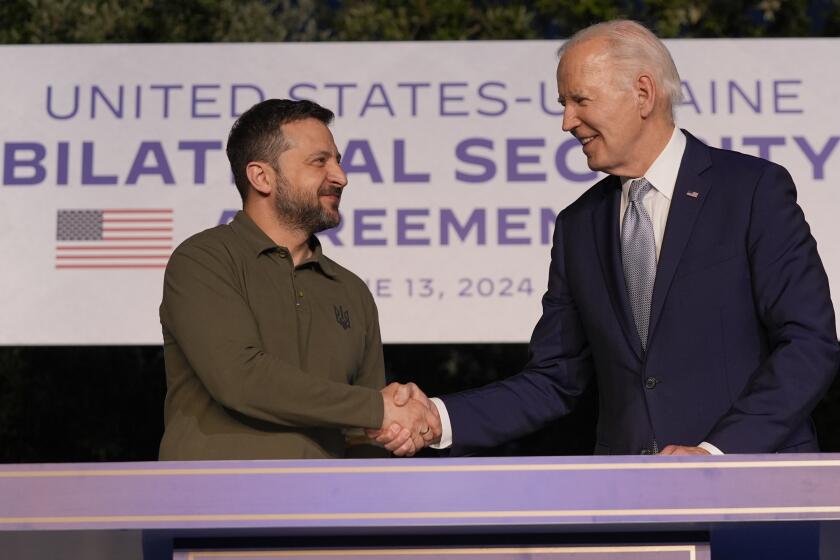G-7 leaders tackle migration and AI — but are divided on abortion rights

- Share via
BARI, Italy — The Group of 7 leading industrialized nations turned their attention to migration, artificial intelligence, economic security and the Indo-Pacific region on Friday, the second and final day of their summit in Italy. The G-7 leaders stressed their determination to meet global challenges “at a crucial moment in history.”
The leaders gathering in a luxury resort in Italy’s southern Puglia region also discussed financial support for Ukraine, the Israel-Hamas war in Gaza, climate change, Iran, the situation in the Red Sea, gender equality and China’s industrial policy and economic security.
“We are working together and with others to address the pressing challenges of our time,” the G-7 leaders said in a final communique, noting their solidarity with Ukraine, support for a deal that would lead to an immediate cease-fire and release of hostages in Gaza, investment in sustainable infrastructure in Africa and commitments to address climate change and migration. The G-7 nations are Canada, France, Germany, Italy, Japan, the United Kingdom and the United States.
Divisions emerged during the summit, however, notably over the lack of a reference to abortion rights in the summit’s final declaration.
Migration was the first topic of discussion Friday, with the leaders considering ways to combat trafficking and increase investment in countries from where migrants start out on often life-threatening journeys.
The topic is of particular interest to summit host Italy, which lies on one of the major routes into the European Union for people fleeing war and poverty in Africa, the Middle East and Asia.
Far-right Italian Prime Minister Giorgia Meloni, known for her hard-line stance on migration, has been eager to increase investment and funding for African nations as a means of reducing migratory pressure on Europe.
The leaders “launched the G7 Coalition to prevent and counter the smuggling of migrants,” the summit’s final declaration said, noting the seven nations would “focus on the root causes of irregular migration, efforts to enhance border management and curb transnational organized crime, and safe and regular pathways for migration.”
British Prime Minister Rishi Sunak said he and Meloni saw “eye to eye” on migration.
Meloni has a controversial five-year deal with neighboring Albania for the Balkan country to host thousands of asylum seekers while Italy processes their claims. She has also spearheaded the “Mattei Plan” for Africa, a continentwide strategy to increase economic opportunities at home and so discourage migration to Europe.
Britain has a deal with Rwanda to deport some asylum seekers to the African country, although no flights have yet taken off. Human rights organizations have denounced the agreement as unethical and unworkable.
The United States has also been struggling with the number of migrants at its southern border. President Biden introduced new policies to curb migration after Republicans stymied a bipartisan-crafted bill he tried to get through Congress. Immigrant rights advocates have filed lawsuits over the new policies.
Pope Francis became the first pontiff to address a G-7 summit, delivering a speech on artificial intelligence. Other invitees include Ukrainian President Volodymyr Zelensky, Brazilian President Luiz Inácio Lula da Silva, Indian Prime Minister Narendra Modi and Turkish President Recep Tayyip Erdogan.
The summit opened Thursday with a strong show of support for Kyiv: an agreement on a U.S. proposal to back a $50-billion loan to Ukraine using frozen Russian assets as collateral. Russian President Vladimir Putin denounced the freezing of Russian assets as “theft” and vowed it “will not go unpunished.”
Biden also signed a bilateral security agreement with Zelensky, aiming to send a signal to Russia of U.S. resolve in supporting Ukraine.
Biden and Zelensky sign deal on G-7 sidelines. The U.S. and European countries agree to freeze Russia’s sanctioned Russian assets until it pays Ukraine war reparations.
Some cracks appeared among the G-7 leaders, notably French President Emmanuel Macron deploring a lack of a reference to abortion in the summit’s final document.
The statement after last year’s summit in Hiroshima, Japan, expressed a commitment to provide access to safe and legal abortion to women and girls, and pledged to defend gender equality and the rights of members of the LGBTQ+ community. The word “abortion” was absent from this year’s final communique, although it included a reference to promoting sexual and reproductive health rights.
“It was not possible to reach agreement on these things in the room,” a senior EU official said, speaking on condition of anonymity to reveal details of the private discussions.
Asked Thursday about reports that abortion rights would not be included in the final text, Macron said it was something he regretted. France “has included women’s right to abortion, the freedom of decision on one’s own body, into its Constitution,” he said.
“It’s not a vision that’s shared across all the political spectrum,” Macron said, replying to a question from a reporter.
Meloni, who campaigned on a “God, Family, Fatherland” motto, has denied she is rolling back rights to abortion, which has been legal in Italy since 1978. But the center-left opposition has warned that her initiatives are chipping away at those rights, including by giving antiabortion groups access to women considering abortions.
Becatoros writes for the Associated Press. AP writers Colleen Long in Borgo Egnazia, Italy, and Maria Grazia Murru in Bari contributed to this report.
More to Read
Sign up for Essential California
The most important California stories and recommendations in your inbox every morning.
You may occasionally receive promotional content from the Los Angeles Times.











